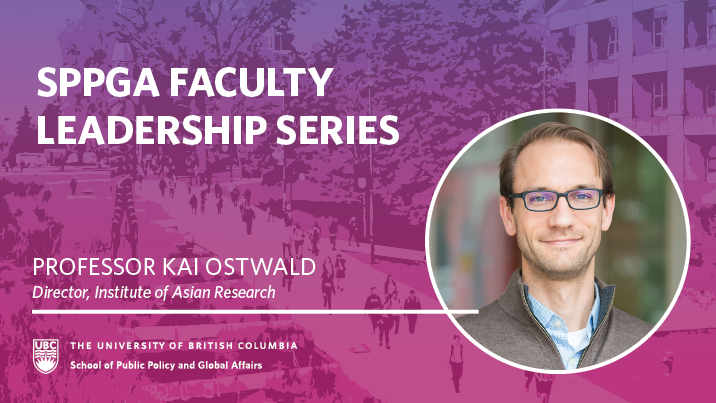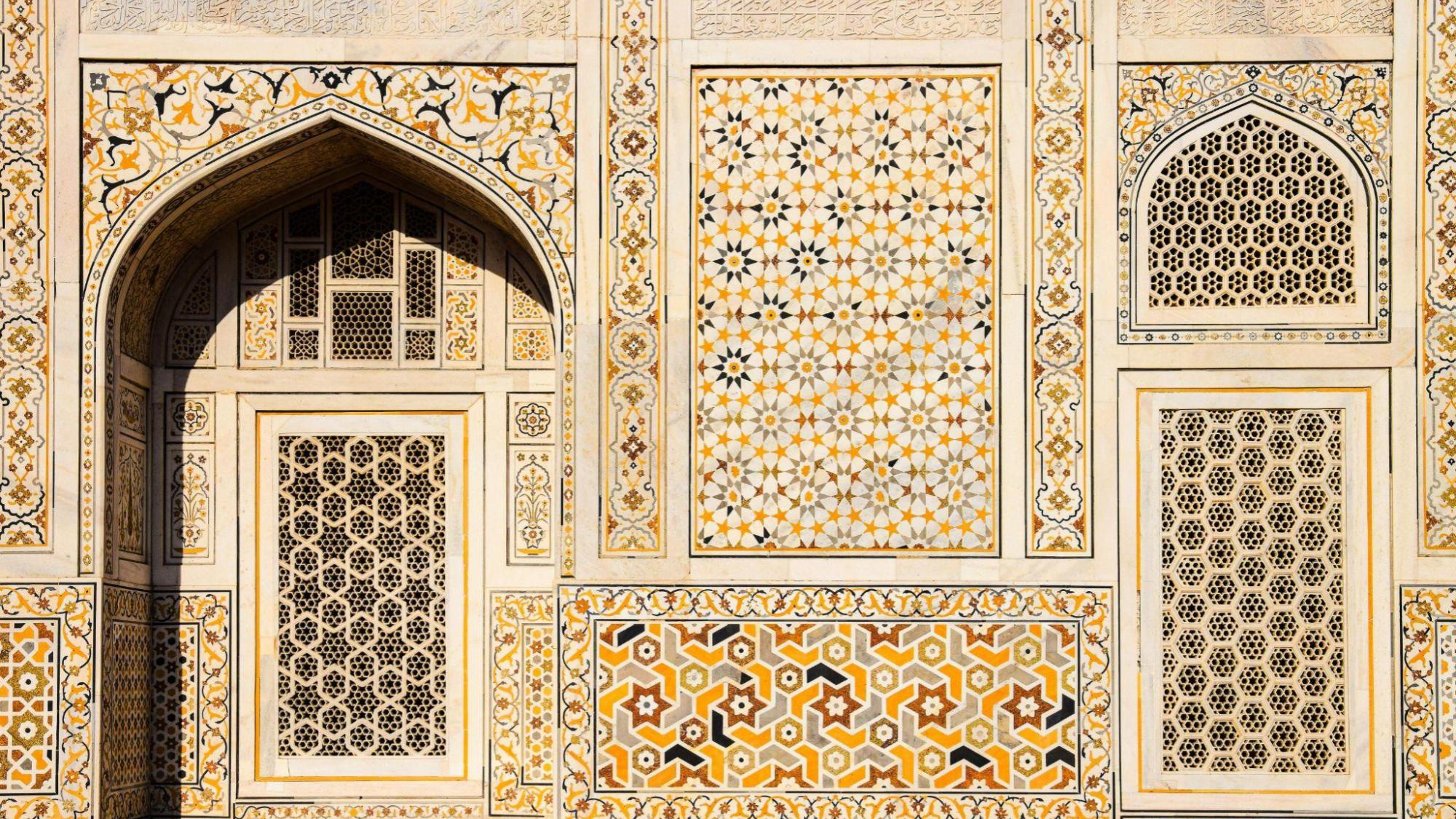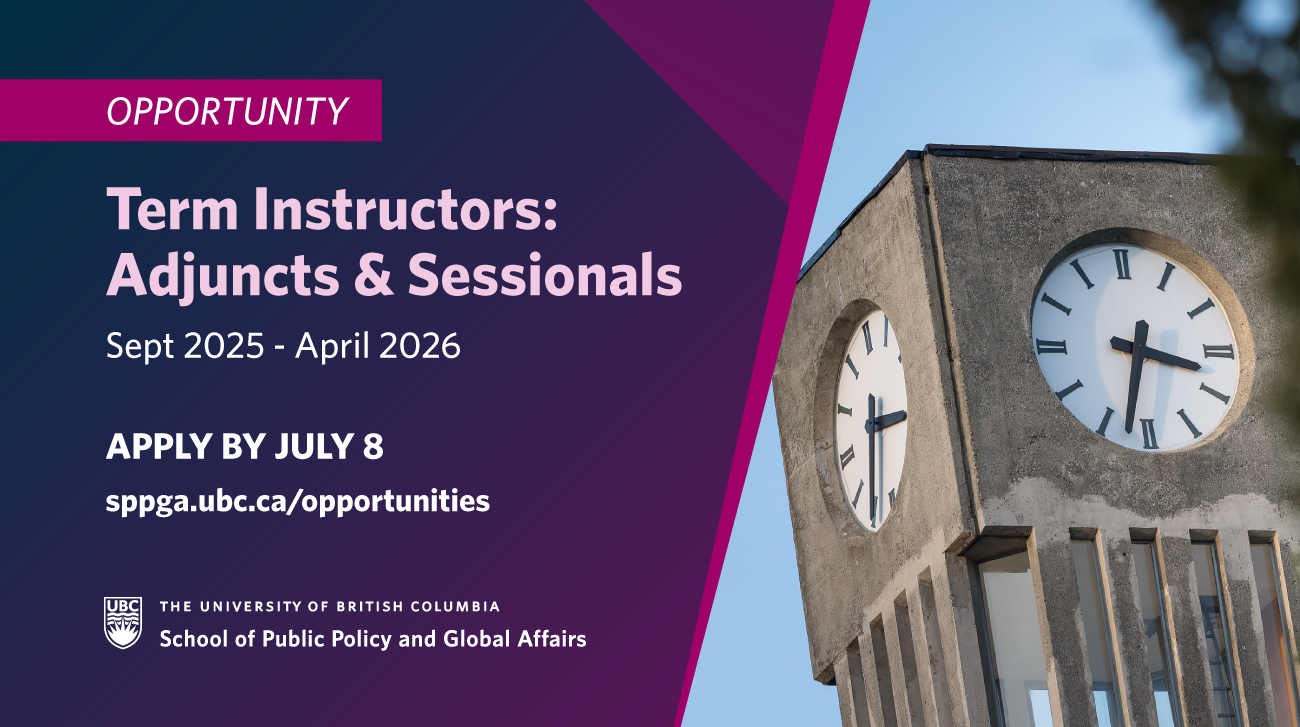In our SPPGA Faculty Leadership series, meet Associate Professor Kai Ostwald, who is jointly appointed with the School of Public Policy and Global Affairs (SPPGA) and the Department of Political Science at the University of British Columbia (UBC).
Dr. Ostwald is the Director of the SPPGA’s Institute of Asian Research (IAR), which is UBC’s primary interdisciplinary institute for the study of current affairs in contemporary Asia.
In this interview with SPPGA, Prof. Ostwald outlines his current research, policy engagement, and leadership of the IAR. Learn more about him below.
SPPGA: Could you please tell us a bit about yourself?
My name is Kai Ostwald and I’m an associate professor at the School of Public Policy and Global Affairs, and also the Department of Political Science at UBC. I am a political scientist by training. Much of my career has focused on contemporary Southeast Asia and is inter-disciplinary in nature; I work on issues around the political and economic development of the region, as well as the relationship between Canada and Southeast Asia.
I came to academics after a brief career in the private sector. I’ve tried to keep one foot in the academy and one foot in the outside world. I do that, in part, through consulting regularly with the Canadian government on foreign policy and development issues in SE Asia. I also consult with the US government on occasion, as well as governments in Southeast Asia.
Parallel to that, I’ve led development projects for the International Development Research Centre (IDRC), most recently one in Myanmar. I also regularly consult for the World Bank on issues of policy and institutional reform in SE Asia.
SPPGA: You are an expert in development, public policy, and ethnic politics with a strong focus on Southeast Asia. What drives your research? What issues keep you up at night and why? What types of questions do you attempt to address?
My research was initially driven by a fascination with how that incredibly dynamic and diverse part of the world grapples with questions of how to accommodate different forms of ethnic diversity in complex political contexts. The approaches taken in Southeast Asia are interesting in their own right, but also because they offer important insights for policy debates on complex issues in other contexts, including Canada.
My work is also driven by current political developments in Southeast Asia. The region’s politics are complex and ever-evolving. That’s the case everywhere to some extent, but it’s especially pronounced in Southeast Asia. This provides opportunities to understand broader political phenomenon that play out in subtler forms in other contexts. For instance, partisan manipulation of electoral boundaries has recently received greater attention as a threat to democracy in the US, but it has been used to ensure the dominance of a single party in Malaysia for decades. In this way, the Malaysian case provides important insights into how that type of manipulation can subvert electoral competition. Of course, there are issues like the now-stalled transition in Myanmar that are profoundly important to the citizens of the country as well as the world.
One of the benefits of keeping one foot in academia and one foot in the world of practice is that I work very closely with people in Southeast Asia. These are meaningful relationships for me. While we’re fairly insulated here from political turmoil and the most devastating impacts of the pandemic here in Canada, many of the partners that I engage with in SE Asia face them up close and personal.
That means that when a country like Myanmar experiences a military coup with a brutal and bloody crackdown on pro-democracy forces, many of the students and partners we’ve worked with in the country are directly in the line of fire; we are, of course, deeply concerned for their well-being.
SPPGA: So you’ve maintained regular communication with your partners and former students in Myanmar during the coup?
Yes, we’ve been in regular touch with all partners, including the six Burmese students that joined the MPPGA program for brief exchanges over the past several years. They’re all safe in the sense that none of them have been arrested. They have stayed reasonably healthy as well, but all have lost people within their families and immediate friend circles, so it’s been a devastating time for them.
Many of our research partners in Myanmar have really struggled since the military coup earlier in 2021. I was a co-editor of a special issue about Myanmar’s democratization and the coup in the Kyoto Review of Southeast Asia – the other co-editor and several contributing authors were based in Myanmar at the time. They wrote their pieces while in hiding. That is a level of difficulty that very few researchers in the other context encounter.
I’m leading a training program for young researchers in Myanmar right now. It‘s part of IDRC’s Knowledge for Democratization Myanmar initiative. We’re working with 22 young researchers who are deeply concerned about being isolated from the global research community due to the coup, and continue to see a role for research in democratizing Myanmar. The program covers topics such as civil-military relations, federalism, transitional justice, social movements, global governance, and constitutional reform, among others. [Information about the program is available at: https://ubcmyanmarinitiative.org]
Of the participants, about half are in hiding and some are joining us from internally displaced people (IDP) camps. Despite these unimaginably difficult circumstances, we’ve had nuanced and thoughtful discussions about very difficult topics, with almost no absences. It’s been so inspiring and humbling to witness their commitment to learning and critically engaging challenging issues – as they’ve repeatedly said, nothing is abstract for them in the current context, since they are living through these issues in a visceral way. I can say without hesitation that I and the other instructors have learned at least as much from the discussions as the participants have. It has been such a privilege to work and learn together with them.
SPPGA: What are you working on currently? With whom are you collaborating?
I am the co-editor of a forthcoming special issue on Canada – Southeast Asia relations that will be published in the Canadian Foreign Policy Journal. This is the first volume of its kind in quite a while to systematically examine various aspects of the Canada – SE Asia relationship, including dimensions like security, development, trade, the SE Asian diaspora in Canada, and so on. It comes at a time when the Canadian government recognizes the importance of diversification, and as a Pacific nation, sees the potential in more closely partnering with Southeast Asia.
Canada recently announced the beginning of negotiations for an ASEAN-Canada Free Trade Agreement. That’s something that our MPPGA student Global Policy Project teams have worked on over the last few years; several of the studies we produced together with the Canada-ASEAN Business Council (CABC) contributed towards moving the FTA discussions forward, which is a noteworthy achievement for our program. We remain in conversation with Global Affairs Canada and other organizations around the FTA.
SPPGA: What types of policy engagement are you currently pursuing? How does your work impact issues and/or policies in SE Asia?
As a consultant for the World Bank over the last two years, I was involved in several reports on institutional reform in Malaysia, specifically around fiscal and administrative federalism in Malaysia. That work explored how resources and decision-making power are distributed across different levels of government, and how reforms could support stronger governance and more sustainable growth.
I’ve also consulted with the Canadian and US governments on policy responses to countries in SE Asia, in particular Myanmar and Malaysia. That has often focused on making sense of political developments and the ways in which the Canadian and US governments might constructively engage counterparts in SE Asia on challenging issues.
Understanding social, economic, and political issues in SE Asia requires close collaboration with partners in the region. The pandemic has been a real professional challenge in that sense, since it has been difficult to continue deep engagement with partners in the absence of physical presence – technology is great, but I find that while Zoom allows us to talk to one another, there are limits to the depth of engagement. There’s just no substitute for being in a place and having unplanned conversations that lead to mutual observations.
I’ve spent a lot of time in Burma over the past six years, and I tried to make stops in Singapore, Malaysia, and Thailand on each transpacific trip; I visited Indonesia and Vietnam less frequently, but still once a year or so. I have a network of researchers and practitioners in each country, both emerging and senior, that I tried to spend time with. I especially valued the informal dinners with young researchers – those were always so illuminating, thought-provoking, and inspiring, not just for the insights I took away, but also for the energy the young researchers brought to questions I think about professionally. I really hope to resume those discussions and see these colleagues and friends again soon.
SPPGA: What makes the Institute of Asian Research unique? How can UBC students become involved with the IAR? What is your vision for the IAR and SPPGA?
UBC and Vancouver play an important role as gateways to the Asia Pacific for Canada. In the pre-pandemic days, ambassadors from Southeast Asia would often stop in Vancouver on trips between Ottawa and their home countries. The Institute of Asian Research (IAR) was one of the main meeting places for those engagements in the past: in the pre-pandemic days, IAR regularly hosted high-level government officials and others involved in the policy process, often being the forum for important discussions. This unique positioning brought immense value to IAR.
As part of UBC’s School of Public Policy and Global Affairs, we’d like IAR to continue being a meeting place for academic, practitioner, and community expertise on Asia and transpacific relationships. We’re especially keen to see IAR host diplomatic and development professionals with an Indo-Pacific focus, though we continue to see the job of understanding contemporary Asia as inherently inter-disciplinary, with important roles for a broad spectrum of academic expertise ranging from anthropology and history through political science and economics.
In terms of training, we would like to see IAR play a key role in building the global affairs component of the MPPGA program. Through that, IAR will continue contributing to the training of the next generation of foreign affairs and development professionals, both for Canada and other countries. The focus would obviously tend towards Asia, but given the rising importance of China, India, and other Indo-Pacific countries in global politics, we don’t see this as ‘niche’ training, but rather as a general requirement for being a competent global affairs professional in the 21st century.
We’ve just launched the IAR Fellows Program. It recognizes the important contributions that graduate students make in cementing UBC’s role as one of North America’s leaders in understanding contemporary Asia. The fellows come from all across campus, representing disciplines from Anthropology and Economics to History, Political Science, Forestry, and the Applied Sciences. They meet at the Institute of Asian research or within the IAR’s five regional Asia research centers to bring interdisciplinary perspectives to bear on the most pressing issues facing contemporary Asia.
The purpose of the program is to recognize graduate student contributions to research, but also to foster holistic interdisciplinary thinking around the complex global issues that face Asia and emerge from Asia’s changing role in the world. This is essential, because many of today’s wicked problems have causes and implications that extend well beyond traditional disciplinary boundaries, thus calling for broader perspectives and expertise.
“For these reasons, taking an interdisciplinary approach and bringing expertise from a myriad of different disciplines provides us the most holistic possible understanding of these issues.”
I hope that SPPGA is, or at least becomes, recognized as one of the top professional schools for smart, motivated professionals wanting to engage questions of global affairs, diplomacy, development, and sustainability, particularly in the Asian or transpacific contexts. The years ahead will be exciting as we continue to build capacity and form new partnerships with key stakeholders in those areas.
Thank you.



